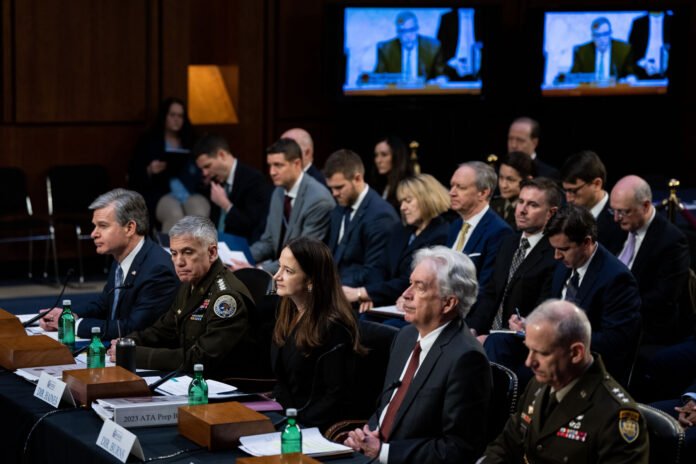U.S. intelligence leaders told lawmakers Wednesday that the Chinese Communist Party remained the “most consequential threat” to U.S. national security, as President Xi Jinping consolidates power and his government takes steps to fuel divides both within the U.S. and between Washington and its allies.
Testifying before the Senate Intelligence Committee as part of the panel’s annual hearing on worldwide threats, Director of National Intelligence Avril Haines said that Xi had “surrounded himself with like-minded loyalists at the apex of the Party Standing Committee,” and continued to work toward solidifying China’s status as a leading regional power as well as a major global power.
“The [Chinese Communist Party] is increasingly convinced that it can only do so at the expense of U.S. power and influence,” Haines said.
While Xi’s recent public remarks indicated a growing “pessimism” about Beijing’s relationship with Washington, Haines said, he likely still believes China would benefit by “preserving stability in its relationship with the United States,” she said.
“In brief, the CCP represents both the leading and most consequential threat to U.S. national security and leadership globally, and its intelligence-specific ambitions and capabilities make it for us our most serious and consequential intelligence rival,” Haines testified in prepared opening remarks.
Senate Intelligence Committee Hears Testimony On Worldwide Threats To The U.S.
(L-R) FBI Director Christopher Wray, Director of the National Security Agency Gen. Paul Nakasone, Director of National Intelligence Avril Haines, CIA Director William Burns and Defense Intelligence Agency Director Lt. Gen. Scott Berrier arrive for a Senate Intelligence Committee hearing concerning worldwide threats, on Capitol Hill March 8, 2023 in Washington, DC.
DREW ANGERER / GETTY IMAGES
Haines appeared alongside leaders from the CIA, FBI, National Security Agency and Defense Intelligence Agency, which were also outlined in a written, unclassified report released Wednesday by the Office of the Director of National Intelligence.
Officials noted that Beijing had continued to “deepen” its relationship with Moscow while growing “increasingly uncomfortable” about providing Russia with meaningful assistance for its invasion of Ukraine.
Haines told the panel the intelligence community believed Russian president Vladimir Putin was now focused on “more modest military objectives for now,” noting Russian forces were unlikely to make major territorial gains this year.
But, she added, Putin had most likely calculated that “prolonging” the war could be the “best remaining pathway to eventually securing Russia’s strategic interests in Ukraine, even if it takes years.”
The ODNI’s written report also said the Iranian regime sees itself “locked in an existential struggle” with the U.S. and its regional allies and will continue to threaten Americans, including former and current U.S. officials, “directly and via proxy attacks.”
Iran has also “accelerated the expansion of its nuclear program” and has conducted “research and development activities that would bring it closer to producing the fissile material for completing a nuclear device” if it decides to, according to the report.
North Korea is another nuclear concern as its leader Kim Jong Un “almost certainly views” such weapons as a guarantee of staying in power, the report said.
TikTok, a popular video app used by tens of millions in the U.S., was not specifically mentioned in the report, but it has come under increasing scrutiny by lawmakers who cite national security concerns.
Wray told lawmakers the Chinese Communist Party could potentially use TikTok — which is owned by Chinese company ByteDance — to collect data on users, control software on devices or spread certain narratives.
“I would make the point on that last one in particular that we’re not sure that we would see many of the outward signs of it happening, if it was happening,” Wray said.
The annual worldwide threats hearings were held Wednesday before the Senate Intelligence Committee and House Intelligence Committee will hold their hearings on Thursday. Both will feature testimony from Director of National Intelligence Avril Haines, CIA Director William Burns, FBI Director Christopher Wray, National Security Agency Director Gen. Paul Nakasone and Defense Intelligence Agency Director Lt. Gen. Scott Berrier.
The hearings offer a rare opportunity for lawmakers and the public to hear directly from intelligence leaders, whose agencies do not offer regular press briefings and whose activities and budgets are partly or mostly classified.
Last year’s assessment – which was released before Russia launched its invasion of Ukraine – said “competition and potential conflict between nation-states remains a critical national security threat,” citing increasingly belligerent signals from Beijing, Moscow, Tehran and Pyongyang.
Sen. Angus King, independent of Maine who sits on the Senate Intelligence Committee, said in a briefing for reporters Tuesday that he had read this year’s report and found it “sobering.”
“My recommendation is, don’t read it just before you go to sleep,” King said.
Source : CBS

